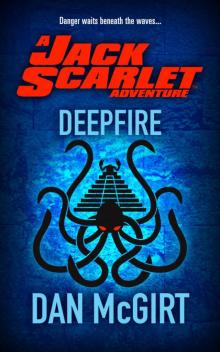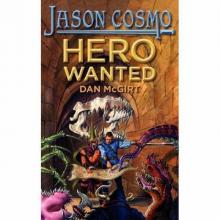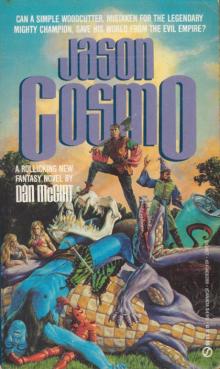- Home
- Dan McGirt
Jack Scarlet
Jack Scarlet Read online
Deepfire
A Jack Scarlet Adventure
Dan McGirt
Deepfire: A Jack Scarlet Adventure
Copyright © Dan McGirt, 2017
All rights reserved.
Cover by April Martinez, Graphicfantastic.com
Published 2017 by Trove Books LLC
TroveBooks.com
JackScarlet.com
Smashwords Edition 1.01, July 2017
Jack Scarlet Adventures
Deepfire
A Cold, Cold Place to Die*
Bullets for Breakfast*
*Coming soon
Sign up for the free Jack Scarlet Universe mailing list for updates on new books in the Jack Scarlet adventure series and other action-packed fiction from Dan McGirt.
***
Table of Contents
Deepfire
Epigraph
Chapter 1 • Chapter 2 • Chapter 3
Chapter 4 • Chapter 5 • Chapter 6
Chapter 7 • Chapter 8 • Chapter 9
Chapter 10 • Chapter 11 • Chapter 12
Chapter 13 • Chapter 14 • Chapter 15
Chapter 16 • Chapter 17 • Chapter 18
Chapter 19 • Chapter 20 • Chapter 21
Chapter 22 • Chapter 23• Chapter 24
Chapter 25 • Chapter 26 • Chapter 27
Chapter 28
Author’s Note
About the Author
More by Dan McGirt
Copyright
Below the thunders of the upper deep;
Far far beneath in the abysmal sea,
His ancient, dreamless, uninvaded sleep
The Kraken sleepeth: faintest sunlights flee
About his shadowy sides; above him swell
Huge sponges of millennial growth and height;
And far away into the sickly light,
From many a wondrous grot and secret cell
Unnumber'd and enormous polypi
Winnow with giant arms the slumbering green.
There hath he lain for ages, and will lie
Battening upon huge seaworms in his sleep,
Until the latter fire shall heat the deep;
Then once by man and angels to be seen,
In roaring he shall rise and on the surface die.
—Alfred Lord Tennyson
1: Gulf of Mystery
Something was very wrong in the Gulf of Mexico.
Dr. Cassidy Settles leaned against the port rail and watched the last red crescent of the sun drop below the horizon. Twilight became gloom became near total darkness. Here and there patches of faint stars peeked through gaps in the thick blanket of clouds. Far across the water winked the navigation lights of other vessels. Save for these distant glimmers, Sandpiper was alone in the dark.
Until the ghost lights came.
They weren’t ghosts, of course, yet the shimmering bands of green light did have a spectral quality. They appeared first in the east, as they had for the past three nights, then spread north and south, racing around the horizon like a pair of gauzy green curtains drawn together to meet in the west, at the very point where the sun had dipped from sight.
Cassi had seen the Northern Lights on trips to Iceland and Canada. These ghost lights were similar in appearance to the aurora borealis, but it was rare to see an aurora this far south, and certainly not one that enveloped the full horizon. The last two nights, the ghost lights had persisted no more than two or three minutes before fading like the afterglow of an extinguished strobe. Tonight’s show hit the five minute mark with no sign of subsiding.
Even so, the ghost lights were not, for Cassi, the strangest phenomenon of the night.
Sandpiper was an oceanographic research vessel on a mission to study marine plastic pollution. Plastic debris rapidly accumulating in the world’s oceans caused problems for humans and sea life, including unfortunate fish and birds that ingested plastic items mistaken for food.
For the past month, Cassi and her team had surveyed contamination levels in the Gulf of Mexico. Starting at the mouth of the Mississippi River, they took water samples to measure the concentration of plastic. They also trawled fish at various depths to determine how much plastic was entering the food chain. Initially they got good data, but Cassi soon faced an unexpected mystery—Where were the fish?
Starting two weeks ago, as they worked their way down the western Gulf, Sandpiper’s crew pulled in far fewer fish than expected. By Cassi’s estimate the populations were at least 60 percent below normal. This was significant enough for her to contact other scientists and confirm the decline wasn’t confined to the Mexican coast. It was happening all across the Gulf. And it wasn’t only fish missing—dolphins, turtles, and manatees had vanished too. Anecdotally, both recreational and commercial fishermen were returning to port empty-handed.
Yet there was no indication of a major fish kill. No rotting carcasses bobbing in the waves. No red tide of algal blooms. The Gulf contained a persistent and documented dead zone—several thousand square miles of oxygen-depleted water along the shores of Texas and Louisiana that could not support marine life. But the abrupt depopulation elsewhere was not the result of hypoxia. Nothing about water conditions offered an explanation. Nothing seemed out of the ordinary, save that all across the Gulf, the animals were simply gone.
Strange. Unprecedented. Disturbing.
But no longer a mystery.
A few hours ago, Sandpiper found the missing fish.
All of them.
And that was a problem.
***
“This is unbelievable,” said Eric, for at least the twelfth time. The blond Californian was a marine biology grad student from Pac State, and the expedition’s videographer. He trained his handheld camera on the water. “I’ve never seen anything like it.”
“No one has,” said Cassi.
The sea around Sandpiper boiled with life. For three miles in all directions, fish breached constantly. Cassi spotted everything from mackerel to marlin. Several distinct pods of bottlenose dolphin and striped dolphin leapt in the waves. There were sea turtles too.
Just before sundown, the crew ran a trawl and got a catch that strained the motors hauling in the net—and strained belief. Sharks, rays, eels, shrimp, sawfish, striped mullet, red and black drum, amberjack, cobia, snook, pompano—pretty much everything one might expect to find in the Gulf, though not necessarily find here. Many of these species lived in shallow coastal waters. The nearest coastline was the Yucatán Peninsula, about two hundred nautical miles south of Sandpiper’s position.
What could drive—or lure?—so many different species together so far from their natural habitats? It was highly aberrant. So was the apparent lack of feeding behavior. Thousands of sharks, and none were feeding on what had to be the easiest prey of their lives. Nor were other predator species taking advantage of the bonanza. It defied all expectations.
“Should we run the trawl again?” asked Eric.
Cassi shook her head. “Maybe later. Let’s see what effect sundown has. Maybe they’ll disperse. Keep recording. I’m going to check in with the skipper.”
“You got it.”
Cassi climbed the ladder to the bridge. Sandpiper’s captain, Fred Parker, was at the helm. The barrel-chested officer, intent on piloting the vessel, spared her a glance.
“Strange tides, Doc?” Parker jerked his thumb at the sonar scope. The display was almost solid green, indicating the huge mass of fish surrounding the ship.
“The strangest,” said Cassi. “I wish we had the ROV and a deep acoustic array aboard. I really want to scope this megaschool at depth.”
“Megaschool, eh?” Parker spat tobacco juice into the rusty coffee can at his feet.
“I don’t know what else to call i
t.”
“Looks more gigaschool to me.”
Cassi laughed. “It may be. Any response from other research vessels in the area? We need to get someone here with the right equipment to fully document this.”
Parker spat. “None that will get here tonight.”
“Damn! We don’t know how long this will last.”
“True enough.” The captain frowned. “And we may have seen all we’re going to see.”
“What do you mean?”
Parker tapped the chart beside him. “We’re near San Marcos. They’re touchy about unauthorized vessels in their waters.”
Cassi was unimpressed. “They’ll surely approve a scientific research mission with this happening?”
Parker shrugged. “Only thing sure about the San Marcos coast guard is you don’t want to cross them.”
“How close are we?”
“Closer than I want to be. But they haven’t hailed us.”
“We’ll deal with it when they do.”
“Sure,” said Parker. He spat another thick wad of brown juice into the can. “Who knows? Maybe they’re as curious about Fishageddon as you are. But don’t count on it.”
Cassi frowned. “I understand.”
“Not quite, you don’t. Flip the scope there to full-range view.”
Puzzled, Cassi complied. Most of the screen remained solid green, but to the northeast was a quarter-mile radius circle that seemed to be clear of fish.
“What’s that?”
“My guess, it’s the center of this pot of fish stew,” said Parker. “We’re only crossing the rim of it.”
“But what’s there? Seamount? Reef?”
The skipper shook his head. “Platform. Oil rig.”
“There are no drilling leases this far out.”
“No American leases, no. That’s San Marcos waters. Leased to LiquiOil, I believe.”
Cassi chewed her lower lip, a habit when she was puzzled. “The fish are avoiding the platform. If there is active drilling there, that might...” She let the thought trail off as another formed. “If the platform is an epicenter, it suggests this megaschool—assuming an even distribution—is what? Ten, twelve miles in diameter? If the fauna density is the same as we’ve seen so far...” Cassi whistled.
“Big, eh?” said Parker.
“Your gigaschool may be closer to the mark. But that’s a lot of assumptions. We need to get closer to the platform.”
“I can ask,” said Parker, reaching for the radio. “But like I said, don’t get your hopes up.”
“Tell them this is a scientific—”
“I will.”
Cassi nodded. “I’ll try to raise NOAA on the sat phone. An official request might help.”
“Worth a shot,” said Parker. “In fact—what the hell!”
A dark-colored, sinuous shape broke the surface thirty yards off the starboard bow. At the same time a sudden wave rocked the 185-foot Sandpiper side to side.
Cassi stumbled. She steadied herself against the bulkhead.
“Was that a whale?” she said, knowing the answer.
“That was no whale,” said Parker.
“No,” said Cassi, barely audible.
A hollow rumble echoed through the ship. It came from below, vibrating through the steel hull. It was a low, deep, primal sound like clashing stones or grinding metal. The geologic bass tones were accompanied by a terrible, screeching, high-pitched, organic cry. Cassi felt more than heard the sound, felt it shudder through her body. Her balance fled. Nausea churned her guts.
She never got seasick! Never! What was this?
“That’s...not whale song,” she choked out, fighting the urge to vomit.
The sound subsided. Red-tinged lightning flashed in the clouds.
Eric burst onto the bridge. He looked as though he’d lost his sea legs too. He was completely soaked. Seawater dripped from his long hair. “Did you see that?” he asked, unable to contain his excitement.
“Did you get it?” demanded Cassi.
“Oh, yeah. Almost dropped the camera when the boat pitched, but I got it!”
“Whale?”
“No way,” said Eric. “What, I don’t know. But it scared everything else away.”
“What do you mean?” asked Cassi.
“All the fish skedaddled. Cleared out like that.” Eric snapped his fingers.
Cassi shook her head. She was having a hard time absorbing these strange events, one after the other. “Amazing,” she said. “What could—”
The rumble and screech returned.
“Brace!” said Parker. “All hands brace!” he shouted into the com.
An upwelling appeared to port, creating a forty-foot wave that crashed against Sandpiper. The deck pitched hard, throwing Eric against Cassi and both of them against the bulkhead.
“Hold on!” said Eric.
An even bigger upsurge blistered from the surface, big enough to lift the ship with it, raising Sandpiper’s prow to vertical, then past ninety degrees.
Flattened against the bulkhead, Cassi looked up through the windscreen as the ship momentarily stood on its stern. What she saw was beyond comprehension, something that should not, could not exist outside of legends and nightmares.
“Oh my God!” she exclaimed.
Sandpiper somersaulted backward. The ship hit the water topside down and Cassi’s world became wet, rushing blackness.
2: Above the Chief
“The wind is right,” said Jack Scarlet. “Let’s do it.”
Jack peered down at the swift-flowing Chief River, almost five hundred feet below the south rim of the canyon. His blue-eyed gaze wandered up from the brown water to the north rim, a quarter mile away, framed against the clear Idaho sky. The lean, dark-haired twenty-something’s agile mind was subconsciously calculating angles, wind speed, air resistance, thrust, and a dozen other variables that might baffle a whole team of engineers.
“Remind me again why we want to do this?” said Galahad TwoHawks. Aviator mirrorshades hid his dark brown eyes. Galahad wore jeans and a custom leather biker jacket with a multi-colored thunderbird beaded across the back. He had the reddish-brown skin and high cheek bones typical of the Monoga. Straight black hair, held back from his face by a knotted blue bandana, reached his shoulders.
“What do you mean we, red man?” Jack gave his friend a sidelong look and a crooked half-smile. “Looks like I’m the only one doing it.”
Galahad nodded solemnly. “That’s because I am blessed with the good sense God above so abundantly withheld from you, kemo sabe.”
Jack laughed. “No guts, no glory.”
Galahad pointed down to the river. “Your guts will be feeding salmon.”
“Wrong season.”
“Why would you want to jump this canyon, when there are so many more sensible things we could be doing right now, many of them involving beer?”
“Because –”
Galahad raised a warning hand. “And don’t say ‘because it’s there.’ That’s trite.”
“Because Evel Knievel never did.”
“And so he lived to a respectable old age,” said Galahad.
“He tried the jump, Gal.”
“Once. And learned his lesson,” said Galahad.
“He had nineteen-seventies equipment,” said Jack. “The jetcycles are much better.”
The bikes, one bright red, one matte black, stood behind them like a pair of patient steeds. With gyroscopic balance and micro-actuators, the jetcycles stayed upright without kickstands.
“The great Knievel also had months of planning and preparation,” said Galahad. “He did not wake up one morning, say to his friend, ‘Let’s go for a ride,’ lead his friend here under false pretenses, then say, ‘Let’s jump over this canyon for no good reason.’”
“No,” admitted Jack. “But it’s such a beautiful day. Might as well jump.”
“Don’t give me that bison dip,” said Galahad. “You planned this from the moment you loaded the
se rocket bikes on the plane.”
“Jetcycles.”
“Whatever.”
Jack strapped on his plastisteel helmet. It was bright red and oblong in shape, tapering back to a point like an ancient pharaoh’s headdress. In fact, the design had come to Jack during a charity benefit held in the Egyptian wing of the Metro City Museum of History. The shape had numerous structural and aerodynamic advantages over conventional crash helmets, including room for an integrated high-throughput TeraChip HeX processor with modified COLT memory array and a TelVox uplink module dual-powered by engraved solar micropanels and a piezoelectric fuel cell. Having a networked supercomputer in your headgear was often handy.
“So you don’t think the bikes can hack it,” said Jack.
“Not about the bikes, Jack. You are the master of invention and design, there is no question. If you tell me these bikes will jump the Grand Canyon, never mind the Chief, I believe you. Your stuff works.” Galahad pursed his lips. “Most of the time.”
Jack laughed. “Such faith.”
The corner’s of Galahad’s eyes tightened. “I have staked my life on your inventions many times. I will do so again, I know. When it is necessary. When the alternative is certain death, as too often it is when I am with you, then, yes, I will straddle a rocket bike—”
“Jetcycle.”
“—and jump across a lava pit full of laser sharks. But why must you tempt the Soul Taker for no reason at all?”
“Life is risk,” said Jack
Galahad scoffed. “Life is also drinking and dancing with pretty girls at the Big Sky Saloon over in Knife Point. I say that life is better than jumping over a big ditch.”

 A Cold, Cold Place To Die
A Cold, Cold Place To Die Bullets for Breakfast
Bullets for Breakfast Jack Scarlet
Jack Scarlet Hero Wanted
Hero Wanted Jason Cosmo
Jason Cosmo Sarah Palin: Vampire Hunter (Twinkle)
Sarah Palin: Vampire Hunter (Twinkle)